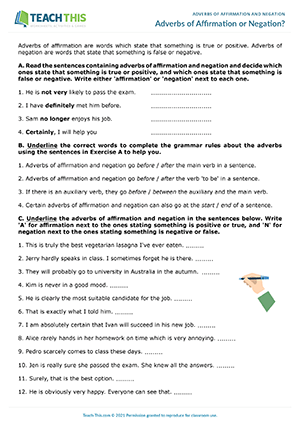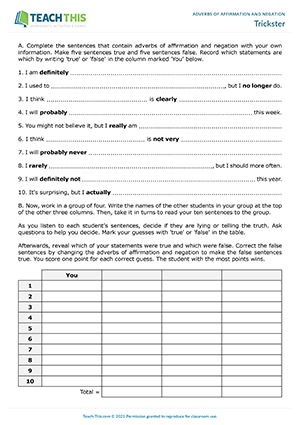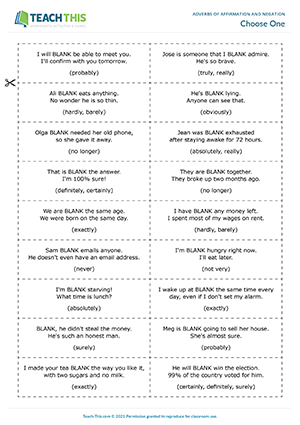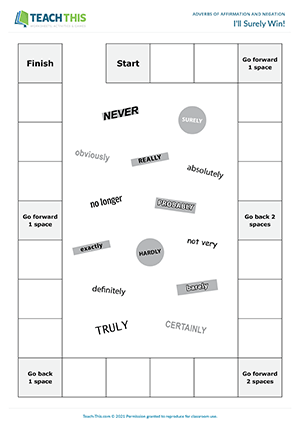This comprehensive adverbs of affirmation and negation worksheet helps students to identify and practice using affirmation and negation adverbs. First, students read sentences containing adverbs of affirmation and negation and decide which ones state that something is true or positive, and which ones state that something is false or negative. Next, students choose the correct words to complete grammar rules about the adverbs. Students then identify adverbs in sentences and mark them as either 'A' for affirmation or ‘N' for negation. After that, students arrange words to form sentences that use adverbs of affirmation or negation. Students then move on to complete sentences using adverbs of affirmation or negation from a box. Lastly, students circle the correct adverb of affirmation or negation in each true or false statement. Students then discuss the statements with a partner and decide if they are true or false.
In this amusing adverbs of affirmation and negation game, students make true and false statements about themselves with adverbs of affirmation and negation and then guess whether their classmates' statements are true or false. Working alone, students complete sentences that contain adverbs of affirmation and negation with their own information, making five sentences true and five false. Students record which statements are which by writing 'true' or 'false' in the column marked 'You' in the table. Next, in groups, students write the names of other students at the top of the three columns. Students then take it in turns to read their ten sentences to the group. The other students decide if each statement is true or false by marking their guess 'true' or 'false' in the table. Afterwards, students reveal which statements were true or false. Students then correct the false statements by changing the adverbs of affirmation and negation to make the false sentences true. Students score one point for each correct guess. The student with the most points wins the game.
In this free adverbs of affirmation and negation game, students race to complete sentences with affirmation or negation adverbs. In groups, students take it in turns to pick up a card and read the sentence or sentences aloud to the other students using the word 'blank' for the missing adverb of affirmation or negation, e.g. 'I will BLANK be able to meet you. I'll confirm with you tomorrow'. The other students listen and then race to grab the correct adverb of affirmation or negation card to complete the sentence. The first student to grab the correct card from their set and give it to the reader, saying the adverb at the same time (e.g. probably) wins and keeps the sentence card. The student with the most cards at the end of the game wins.
In this fun adverbs of affirmation and negation board game, students practice creating sentences with affirmation and negation adverbs. In groups, students take it in turns to pick up a card from the pile and use the adverb of affirmation or negation shown on the card to create a sentence. Each sentence made in the game must be unique. If the group members agree that the sentence uses the adverb correctly and is grammatically correct, the student rolls the dice and moves the number of spaces indicated by the dice. If the student makes an incorrect sentence or repeats a sentence made by another student, they stay on the same square and don't roll the dice. The first student to reach the finish wins the game.
Latest Free
Resources
- Everyday Objects Bingo
Everyday Objects
Elementary (A1-A2)
- Action Verb Races
Actions
Elementary (A1-A2)
- Birthday Basics
Birthdays
Elementary (A1-A2)
- Sales Phrasal Verbs
Business Phrasal Verbs
Upper-intermediate (B2)
Latest Member
Resources
- Collocations at Work
Business Collocations
Intermediate (B1)
- Etiquette Trivia Board Game
Etiquette and Manners
Upper-intermediate (B2)
- Everyday Objects Vocabulary
Everyday Objects
Pre-intermediate (A2)
- Let's have a talk
Verb-Noun Collocations
Pre-intermediate (A2)







